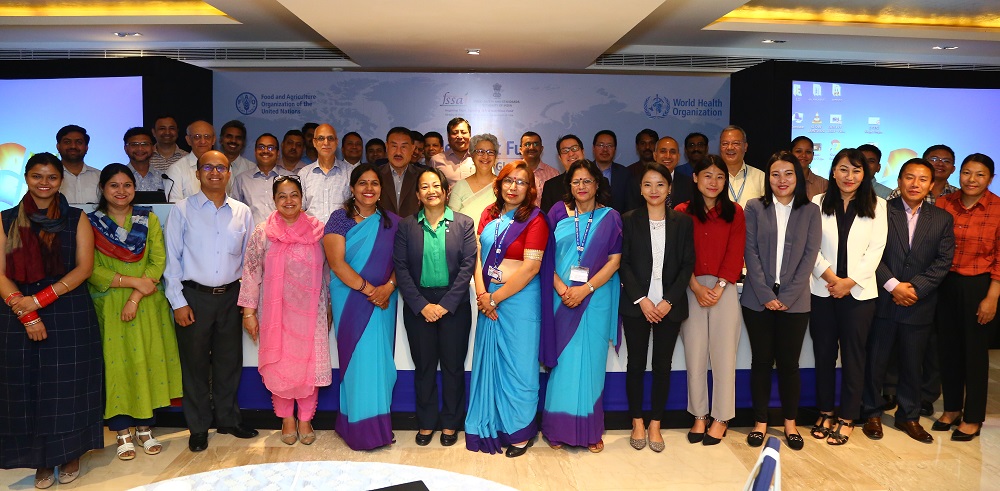Bhutan, India and Nepal gear up for joint Codex Trust Fund project
Officials of the Governments of Bhutan, India and Nepal launched a joint Codex Trust Fund Project at a workshop held in New Delhi, India 21 June 2019.
The project includes a mix of group and individual activities and will run for a period of three years. Year one will see a workshop on risk assessment, advocacy and awareness programmes and training for capacity building on Codex standard setting procedures and processes.
Ms. Rita Teaotia, Chairperson, Food Safety and Standards Authority of India said the day marked “a common starting point for the three countries to achieve the common goal of building a strong national Codex structure and food safety ecosystem”.
In total around 40 participants from the three countries including representatives from Government departments and educational/research institutions participated in the workshop.

Workshop participants New Delhi, India, 21 June 2019
Mr Purna Chandra Wasti, Senior Food Research Officer, Department of Food Technology and Quality Control of Nepal said, “Following the theme of World Food Safety Day, Codex needs to be connected to everyone’s daily life to be effective”.
Participants examined the project action plan and held detailed discussions around implementation and projected timelines.
“Bhutan is fully committed to accomplishing the objectives of this project and seeks to build a strong national Codex structure”, said Mr Namgay Wangchuk, Director General of the Bhutan Agriculture and Food Regulatory Authority.
Sanjay Dave, former Chairperson of the Codex Alimentarius Commission, Gyanendra Gongal, from the WHO Regional Office for South-East Asia and experts from WHO country offices in India and Nepal were also in attendance and will provide support to the Codex Trust Fund project.
Did you know
The FAO/WHO Codex Trust Fund is in its fourth year of operation and thanks to donor contributions, is currently supporting 14 countries with a further 13 programmes planned. The fund delivers support to build strong and sustainable national Codex systems that will allow all countries to participate fully and effectively in the work of Codex.
Read more
At the heart of the Codex mandate are the core values of collaboration, inclusiveness, consensus building and transparency. Governmental and non-governmental, public and private organizations alike play a vital role in ensuring Codex texts are of the highest quality and based on sound science.
Codex would have little authority in the field of international standard setting if it did not welcome and acknowledge the valuable contributions made by observers. Expert technical bodies, industry and consumer associations
contribute to the standard-setting process in a spirit of openness, collaboration and transparency.
Intergovernmental organizations (IGOs) and international non-governmental organizations (NGOs) can apply for observer status in Codex in order to attend and put forward their views at every stage of the standard-setting process.
 Current Codex Alimentarius Commission
Current Codex Alimentarius Commission
Bhutan, India and Nepal gear up for joint Codex Trust Fund project
Officials of the Governments of Bhutan, India and Nepal launched a joint Codex Trust Fund Project at a workshop held in New Delhi, India 21 June 2019.
The project includes a mix of group and individual activities and will run for a period of three years. Year one will see a workshop on risk assessment, advocacy and awareness programmes and training for capacity building on Codex standard setting procedures and processes.
Ms. Rita Teaotia, Chairperson, Food Safety and Standards Authority of India said the day marked “a common starting point for the three countries to achieve the common goal of building a strong national Codex structure and food safety ecosystem”.
In total around 40 participants from the three countries including representatives from Government departments and educational/research institutions participated in the workshop.

Workshop participants New Delhi, India, 21 June 2019
Mr Purna Chandra Wasti, Senior Food Research Officer, Department of Food Technology and Quality Control of Nepal said, “Following the theme of World Food Safety Day, Codex needs to be connected to everyone’s daily life to be effective”.
Participants examined the project action plan and held detailed discussions around implementation and projected timelines.
“Bhutan is fully committed to accomplishing the objectives of this project and seeks to build a strong national Codex structure”, said Mr Namgay Wangchuk, Director General of the Bhutan Agriculture and Food Regulatory Authority.
Sanjay Dave, former Chairperson of the Codex Alimentarius Commission, Gyanendra Gongal, from the WHO Regional Office for South-East Asia and experts from WHO country offices in India and Nepal were also in attendance and will provide support to the Codex Trust Fund project.
Did you know
The FAO/WHO Codex Trust Fund is in its fourth year of operation and thanks to donor contributions, is currently supporting 14 countries with a further 13 programmes planned. The fund delivers support to build strong and sustainable national Codex systems that will allow all countries to participate fully and effectively in the work of Codex.
Read more
 Codex and Observer
Codex and Observer
around the world since ancient times.
We might not always know where it comes from,
but we expect it to be available, safe and of good quality.









Leave a comment